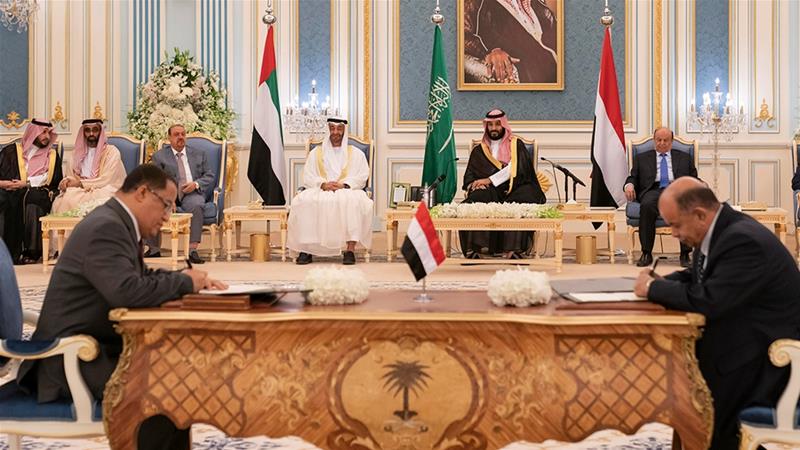 Yemen's internationally recognised government and UAE-backed separatists have signed a power-sharing deal to halt infighting.
Yemen's internationally recognised government and UAE-backed separatists have signed a power-sharing deal to halt infighting.
Saudi Crown Prince Mohammed bin Salman announced the agreement between the Yemeni government and southern separatists to end a power struggle in the war-torn country's south, Saudi state TV reported on Tuesday.
Crown Prince Mohammed described the "Riyadh Agreement" as a crucial step towards a political solution to end Yemen's bloody four-year war.
"This agreement will open a new period of stability in Yemen. The kingdom of Saudi Arabia stands with you," the Saudi crown prince said at a signing ceremony in Riyadh aired on state television.
"It's a joyful day in Saudi as the two sides come together."
The agreement will result in a government reshuffle to include the separatists with equal representation, and their armed forces will be placed under government control.
All military and security forces will be incorporated into the defence and interior ministries.
Peter Salisbury, Yemen expert at the Crisis International Group, a Brussels-based think-tank, said the agreement solves two short-term problems - if it can be successfully implemented.
It prevents a war-within-a-war between the southern separatists and Hadi's government. It also provides more credibility to future government negotiations with the Houthis.
However, Salisbury cautioned the deal "is loosely worded and open to interpretation ... and sets an ambitious timeline for implementation".
Damaging infighting
In August, the UAE-backed separatist movement, which seeks self-rule in southern Yemen, turned on government troops as its forces seized their interim seat in the city of Aden.
Weeks of bloody infighting stoked fears of a further weakening of the anti-Houthi rebel bloc and undermining chances for finding a negotiated solution to the civil war.
The UN special envoy for Yemen, Martin Griffiths, congratulated the two sides on the deal.
"The signing of this agreement is an important step for our collective efforts to advance a peaceful settlement to the conflict in Yemen," he said in a statement. "Listening to southern stakeholders is important to the political efforts to achieve peace in the country."
Catherine Shakdam, a former UN Security Council Yemen consultant, told Al Jazeera that Tuesday's agreement was "very significant".
"If anything, I think it will be a blueprint or a cornerstone for bringing peace to Yemen altogether," Shakdam said.
"It offers some degree of consensus, maybe not with all the actors involved in this war in Yemen, but at least some of them. And I think it will allow for a reason to return and it demonstrates to all actors that a peace can be brokered."
Battling the Houthis
The UAE-supported separatist Southern Transitional Council (STC) and Yemen President Abd-Rabbu Mansour Hadi's Saudi-backed government had earlier agreed to an initial deal designed to end the infighting.
The STC is a Yemeni group that joined the Saudi-led military alliance, which first intervened in Yemen in March 2015 to restore Hadi's government shortly after it was removed from the capital, Sanaa, by the Houthi rebels.
Riyadh has sought to refocus the Saudi-Emirati-led coalition on fighting the Houthis on its border, after the rebels repeatedly launched missiles and drone attacks on Saudi cities in recent years.
The kingdom has in recent weeks increased its military presence in southern Yemen, bringing in additional troops, armoured vehicles, tanks and other military equipment.
It took control of Aden earlier this month after the UAE withdrew some of its forces from the city.
The war in Yemen has claimed tens of thousands of lives, pushed millions to the brink of famine, and spawned the world's most devastating humanitarian crisis.
Mohdar al-Omari, a commander with the southern separatist militia, welcomed news of Tuesday's deal.
"We congratulate our southern people with the Riyadh agreement, which is the only solution to the current situation, and we send our congratulations to our military and political leadership for this great and historic occasion."
No comments:
Post a Comment